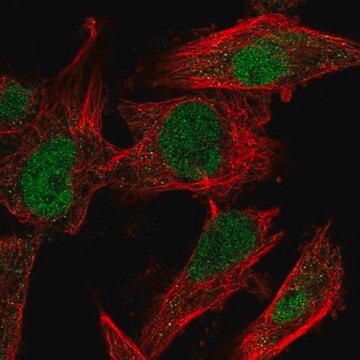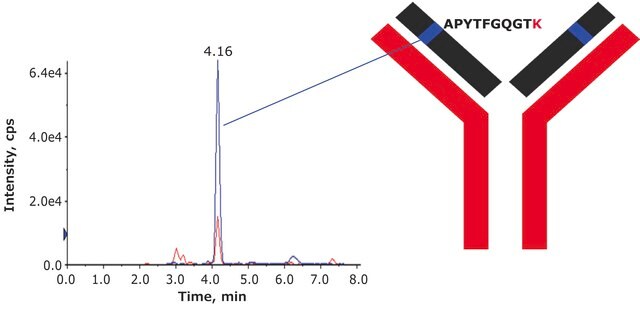M0445
Anti-MDMX antibody, Mouse monoclonal

clone MDMX-82, purified from hybridoma cell culture
Sinónimos:
Anti-HDMX, Anti-MDM4, Anti-p53 Binding Protein
About This Item
ICC
IP
WB
immunoprecipitation (IP): suitable
microarray: suitable
western blot: 1-2 μg/mL using total cell extract of HEK 293T cells transfected with human MDMX
Productos recomendados
biological source
mouse
Quality Level
conjugate
unconjugated
antibody form
purified immunoglobulin
antibody product type
primary antibodies
clone
MDMX-82, monoclonal
form
buffered aqueous solution
mol wt
antigen ~80 kDa
species reactivity
human
enhanced validation
recombinant expression
Learn more about Antibody Enhanced Validation
concentration
~2 mg/mL
technique(s)
immunocytochemistry: suitable
immunoprecipitation (IP): suitable
microarray: suitable
western blot: 1-2 μg/mL using total cell extract of HEK 293T cells transfected with human MDMX
isotype
IgG1
UniProt accession no.
shipped in
dry ice
storage temp.
−20°C
target post-translational modification
unmodified
Gene Information
human ... MDM4(4194)
mouse ... Mdm4(17248)
rat ... Mdm4(304798)
General description
Specificity
Application
Biochem/physiol Actions
Physical form
Storage and Stability
Disclaimer
¿No encuentra el producto adecuado?
Pruebe nuestro Herramienta de selección de productos.
Related product
Storage Class
10 - Combustible liquids
wgk_germany
WGK 3
flash_point_f
Not applicable
flash_point_c
Not applicable
ppe
Eyeshields, Gloves, multi-purpose combination respirator cartridge (US)
Elija entre una de las versiones más recientes:
¿Ya tiene este producto?
Encuentre la documentación para los productos que ha comprado recientemente en la Biblioteca de documentos.
Nuestro equipo de científicos tiene experiencia en todas las áreas de investigación: Ciencias de la vida, Ciencia de los materiales, Síntesis química, Cromatografía, Analítica y muchas otras.
Póngase en contacto con el Servicio técnico







